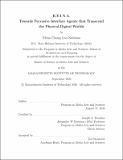| dc.contributor.advisor | Joseph A. Paradiso. | en_US |
| dc.contributor.author | Kodama, Elena Chong Loo. | en_US |
| dc.contributor.other | Program in Media Arts and Sciences (Massachusetts Institute of Technology) | en_US |
| dc.date.accessioned | 2021-01-06T20:15:42Z | |
| dc.date.available | 2021-01-06T20:15:42Z | |
| dc.date.copyright | 2020 | en_US |
| dc.date.issued | 2020 | en_US |
| dc.identifier.uri | https://hdl.handle.net/1721.1/129272 | |
| dc.description | Thesis: S.M., Massachusetts Institute of Technology, School of Architecture and Planning, Program in Media Arts and Sciences, September, 2020 | en_US |
| dc.description | Cataloged from student-submitted PDF version of thesis. | en_US |
| dc.description | Includes bibliographical references (pages 183-190). | en_US |
| dc.description.abstract | Our generation is spending more time in front of computer screens, in part due to the onset of the COVID-19 pandemic. In front of our screens, we see multiple notes, folders, windows, and applications that somehow replicate a metaphoric desk. The way we navigate this digital system has not changed much in the past four decades. However, in the last two years, the technological landscape is showing sign of a potential shift that could enable novel ways of navigating the physical and digital information spaces. Augmented and virtual reality systems are spinning off from laboratories around the world, promising to offer better ways of storytelling, learning, working, and interacting. Just like how window interfaces became established with the development of computer graphics, and voice assistants with smartphones, augmented reality could generate a new natural multi-modal interface for enhancing our interactions with the physical and digital worlds. In this thesis, I am introducing the concept of a Pervasive Interface Agent, a cross-platform agent-based interface that acts as a lifelong companion, assisting us autonomously in both physical and digital worlds. Additionally, I am presenting R.E.I.N.A., a phase 1 prototype of a Pervasive Interface Agent together with the Media Lab Tour Guiding System. A set of experiments called the R.E.I.N.A. experiment were designed and conducted on 101 international participants to gain insights on the effect of agent embodiment in a remote tour guiding experience. The results are also discussed in this work. | en_US |
| dc.description.statementofresponsibility | by Elena Chong Loo Kodama. | en_US |
| dc.format.extent | 190 pages | en_US |
| dc.language.iso | eng | en_US |
| dc.publisher | Massachusetts Institute of Technology | en_US |
| dc.rights | MIT theses may be protected by copyright. Please reuse MIT thesis content according to the MIT Libraries Permissions Policy, which is available through the URL provided. | en_US |
| dc.rights.uri | http://dspace.mit.edu/handle/1721.1/7582 | en_US |
| dc.subject | Program in Media Arts and Sciences | en_US |
| dc.title | R.E.I.N.A. : towards pervasive interface agents that transcend the physical-digital worlds | en_US |
| dc.title.alternative | Towards pervasive interface agents that transcend the physical-digital worlds | en_US |
| dc.type | Thesis | en_US |
| dc.description.degree | S.M. | en_US |
| dc.contributor.department | Program in Media Arts and Sciences (Massachusetts Institute of Technology) | en_US |
| dc.identifier.oclc | 1227784677 | en_US |
| dc.description.collection | S.M. Massachusetts Institute of Technology, School of Architecture and Planning, Program in Media Arts and Sciences | en_US |
| dspace.imported | 2021-01-06T20:15:41Z | en_US |
| mit.thesis.degree | Master | en_US |
| mit.thesis.department | Media | en_US |
